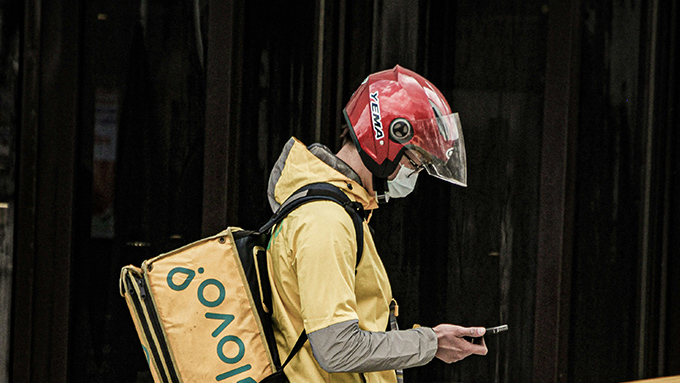Deletion of WhatsApp Correspondence During On-Site Inspections
Introduction
The right to make on-site inspections is one of the Competition Board’s (“Board”) most important tools for revealing whether Law No. 4054 on the Protection of Competition (“Law No. 4054”) has been violated. The effective use of this authority is quite important in terms of obtaining fruitful results from their investigations. Especially with the publication of the Guidelines on the Examination of Digital Data in On-Site Inspections (“On-Site Inspection Guidelines”), the situations that hinder and complicate the on-site inspection as a result of the deletion of WhatsApp correspondence on mobile devices have increased and the number of decisions where the Board has imposed administrative fines have also significantly risen. The Board’s approach towards deleting WhatsApp correspondence during on-site inspections continues to be shaped by its decisions. Specifically, the A101 decision[1] discussed in this article is noteworthy as it demonstrates the current approach of the Board on the subject, as well as the dissenting opinion of some Board members.
The Board’s Approach Set Forth in the A101 Decision
During an investigation[2] carried out by the Board into some undertakings operating as producers, suppliers and retailers in the FMCG sector, an on-site inspection was carried out at Yeni Mağazacılık A.Ş. (“A101”) on 08.12.2021. The computers and mobile devices of various employees present at the company’s premises were subject to examination. The most interesting part of the A101 decision is that the Board evaluated the actions taken by three different employees during the on-site inspection to determine if they constituted a “hindering or complication” for the on-site inspection.
Firstly, as part of the inspection, the business phone of the A101 purchasing general manager was indexed and examined through forensic devices and it was determined that the WhatsApp application was not present on the phone. Subsequently, the employee’s personal phone was examined through the quick review method in order to determine whether it contained digital data belonging to the undertaking. Meanwhile, questions regarding personal information directed to the user during the installation of the WhatsApp application were displayed on the screen. These questions were answered by the employee and the experts could review the application.
When the WhatsApp application was examined, the experts saw that there was no correspondence in the groups where the relevant employee was a participant. Subsequently, the App Store was examined and the experts saw that the WhatsApp application was not among the applications updated and also, the chat backup feature in the WhatsApp application was turned off. In addition, when the mobile device was examined through forensic software, the experts could not detect any log records[3] related to the usage, deletion or reinstallation of the WhatsApp application.
While the computer of another A101 employee was being examined by the experts, they noticed that although it had previously been handed over to the experts as part of the investigation, the employee had turned on his phone. Therefore, the employee’s mobile device was subject to inspection in case he had interfered with the device. The device was examined through forensic software and no log records related to the use of the WhatsApp application were detected.
The product manager, who was not present at the company’s premises during the on-site inspection, was called to the undertaking for the inspection of his computer and mobile device. The employee stated that his personal phone was broken and therefore, he had left the device at home. Accordingly, the experts could not examine his personal phone. When the experts asked for the mobile device he had with him, the employee stated that he had previously deleted the WhatsApp application as it included personal information and chats. However, due to the inability to index on the phone, the experts could not determine whether the WhatsApp application was deleted, or, if there had been a deletion, whether the deletion was made before the on-site inspection started or during the on-site inspection.
On the other hand, as a result of the quick review, the application was not found installed on the mobile device. Thereupon, the WhatsApp application was reinstalled on the mobile device and the correspondence existing within the scope of the last backup were examined with the quick review method in order to determine whether they contained digital data belonging to the undertaking. As a result, the experts found that there was business-related correspondence on the device. Accordingly, the mobile device was subjected to examination through the forensic device. In addition, the broken personal device was taken from the employee’s home and delivered to the experts of the Competition Authority.
As part of its assessment related to the hindering or complication of the on-site inspection, the Board stated that although it was unclear whether any employees engaged in activities aimed at destroying data from their mobile devices during the inspection, no log records were found indicating that the WhatsApp application was deleted as a result of the indexing performed on the phones of two employees with forensic computing devices. The Board also stated that no log record related to the deletion process could be obtained due to the fact that the index of the other employee’s phone could not be obtained. Accordingly, the Board stated that it was not possible to determine through forensic computing devices whether the employees have deleted or reinstalled the WhatsApp application.
The Board emphasized that, in accordance with its established case law, an administrative fine for preventing of an on-site inspection could only be imposed if the deletion had taken place after the on-site inspection had started. In this case, the Board stated that it was not possible to determine whether the deletion process was carried out on the phones of all three employees, and if the deletion was made, it was not possible to detect when the operation was performed. Accordingly, the Board concluded that there was no room for imposing an administrative fine on A101.
The Arguments Stated in the Dissenting Opinion
Two Board members dissented from the decision of the Board, stating that the on-site investigation had been hindered or complicated.
In their dissenting opinion, they emphasized that the on-site inspection authority is the most important and effective means of obtaining evidence for the Board to reveal competition law violations and that due to the nature of an on-site inspection, they must be carried out suddenly, quickly and uninterruptedly, without informing the undertakings.
The dissent also noted that, despite the fact that log records are generally reliable and accurate, the log record of each transaction cannot be detected due to issues such as version incompatibility, up-to-dateness of the software, etc., especially in mobile phone reviews. They explained that while the existence of log records of the transaction allows an almost certain determination of the transaction, the absence of log records or the inability to obtain them cannot be claimed as proof that the transaction was not carried out. At this point, by referring to the Board’s previous decisions,[4] they emphasized that although the Board was unable to detect a log record, there were cases where it was concluded based on other evidence that an on-site inspection had been hindered or complicated as a result of the deletion from the mobile device.
The dissenting Board members also stated that apart from the log records, there was a lot of facts which can be considered as evidence indicating that the on-site inspection was hindered and complicated in this case.
For instance, the on-site inspection started with a delay, a mobile device which was under surveillance was processed without the experts’ permission and the employees alleged to have deleted WhatsApp application are senior-level employees who are the direct focus and target of the on-site inspection.
In addition, the Board members stated that redownloading deleted applications and examining them from the last backup does not eliminate the result of hindering or complicating the on-site inspection, since the deletion process is considered to be a prevention of on-site inspection in itself, regardless of the data being restored. Therefore, the Board members stated that the majority’s interpretation would encourage undertakings to delete data during on-site inspections.
For all of these reasons, the dissent concluded that the on-site examination conducted at A101 was hindered and complicated. Therefore, they stated that an administrative fine should have been imposed on the undertaking in accordance with subparagraph (d) of the first paragraph of Article 16 of the Law No. 4054.
Conclusion
The Board looks at the deletion of WhatsApp correspondence during on-site inspections as potential evidence of hindering or complication of an on-site inspection. Nonetheless, it is not always easy to determine whether WhatsApp correspondence was deleted before or during the on-site inspection. In the A101 decision, due to the absence of a log record for the deletion process, the Board concluded that the on-site inspection was not prevented. On the other hand, during on-site inspections, although the deleted data can be restored through the use of forensic devices or accessed through the devices of other people, there are other decisions of the Board where the deletion process is considered as hindering or complicating the on-site inspection. For this reason, the A101 decision is noteworthy as it reveals that the Board has diverged from its strict approach set forth in its previous decisions.[5] Hopefully, the Board’s upcoming case law will clarify which evidence can definitively prove the deletion of the WhatsApp application and correspondence and in which cases the deletion can be considered as proof of hindering or complicating an on-site inspection.
- The Board’s A101 decision, No. 22-28/464-187 dated 23.06.2022.
- In accordance with the Board's decisions No. 21-23/271-M dated 26.04.2021,, No. 21-26/325-M dated 20.05.2021, and No 21-57/796-M dated 25.11.2021, an investigation has been initiated against some undertakings operating as producers/suppliers and retailers operating in the FMCG sector, in order to determine whether Article 4 of the Law No. 4054 was violated.
- A log record is the process of automatically recording events, time, user name and type of action in an information system.
- The Board’s Medicana Samsun decision No. 21-31/400-202 dated 17.06.2021 and , the Board’s Çiçek Sepeti decision No. 21-27/354-173, dated 27.05.2021..
- The Board’s Eti decision No. 21-24/278-123 dated 29.04.2021 , the Board’s Unmaş decision No. 21-26/327-152 dated 20.05.2021, , the Board’s D-Market decision No. 22-03/35-16 dated 13.01.2922 and , the Board’s İGSAŞ decision No. 21-38/544-265 dated 12.08.2021..
All rights of this article are reserved. This article may not be used, reproduced, copied, published, distributed, or otherwise disseminated without quotation or Erdem & Erdem Law Firm's written consent. Any content created without citing the resource or Erdem & Erdem Law Firm’s written consent is regularly tracked, and legal action will be taken in case of violation.
Other Contents

The U.S. District Court for the District of Columbia (“Court”) issued its memorandum opinion (Memorandum Opinion) on November 18, 2025, in the antitrust case (“Case”) between the Federal Trade Commission (“FTC”) and Meta Platforms Inc. (“Meta”). The FTC alleges that Meta monopolized the market…

No-poach agreements, which have become one of the most prominent concepts in global competition law in recent years, are defined in the Glossary of Competition Terms as “agreements, whether direct or indirect, whereby one undertaking agrees not to make job offers to, or hire, the employees of another...

The Competition Board (“Board”) has broad powers to request information from undertakings. The legal basis for this authority is provided by Article 14 of Law No. 4054 on the Protection of Competition (“Law No. 4054”). Under this provision, the Board may request any information it deems necessary from public...

Competition authorities around the world have increasingly focused on labor market infringements under competition law, issuing new regulations and guidance recently. Notable examples include the U.S. Department of Justice and Federal Trade Commission’s joint guidance, the Japanese Fair Trade Commission’s...

Chapter 8 of the General Data Protection Regulation (“GDPR”) sets out the legal remedies available to data subjects in the event of a breach of their rights under the GDPR. Accordingly, each data subject has a right to lodge a complaint with the supervisory authority of the Member State in which they reside, work...

Mergers and acquisitions play a critical role in shaping the competitive structure of the market. Although such transactions can lead to positive outcomes such as the provision of products and services at lower prices, the development of new products and technologies, and improvements in quality, they may also...

Technology and the opportunities it brings undoubtedly play a key role in strengthening the competitiveness of market players. In this context, pricing algorithms that enable undertakings to monitor publicly available prices and optimize their own pricing strategies have become widely used, especially by digital platforms...

The Regulation on Fines to Apply in Cases of Agreements, Concerted Practices and Decisions Restricting Competition, and Abuse of Dominant Position (“Former Regulation on Fines”), which entered into force upon its publication in the Official Gazette dated February 15, 2009 and numbered 27142, was...

In the past years, the Turkish Competition Board (“Board”) has closely monitored the activities of undertakings operating in the retail sector. As a result of the Board’s record of administrative fines, horizontal type of violations in the retail sector have been highly publicized. Vertical violations such as resale price...

In recent years, numerous automobile manufacturers have announced their goals to reduce carbon emissions, with many brands setting net-zero carbon targets spanning from production processes to the lifecycle of their vehicles. While ongoing debates persist regarding the significantly higher carbon footprint of...

Under Article 15 of Law No. 4054 on the Protection of Competition (“Law No. 4054”), the Competition Board (“Board”) may conduct on-site inspections at the undertakings’ premises when it deems necessary in fulfilling the duties assigned to it. During the on-site inspection, the Board is authorized to examine all...

Agreements and information exchanges between undertakings in labor markets have recently been examined in various preliminary investigations and investigations initiated by the Turkish Competition Authority (“Authority”). Following the investigations in which some undertakings were subject to...

The Turkish Competition Board’s (Board) decision regarding the acquisition of the international road transport business line of Ekol Lojistik AŞ (Ekol) by DFDS A/S (DFDS) has been one of the most prominent transactions on the competition law agenda recently...

The Competition Board (“Board”) has broad powers to request information from undertakings. The Board’s authority to request information arises from Article 14 of the Law No. 4054 on the Protection of Competition (“Law No. 4054”). Under the relevant provision, the Board may request any information it deems...

Doğuş Otomotiv Servis ve Ticaret A.Ş. (Doğuş) applied to the Turkish Competition Authority for an exemption for the practice of recommending basic wages to be applied to sales and after-sales service employees of its authorized dealers and distributors...

Access to Instagram was blocked ex officio by the Information and Communication Technologies Authority (ICTA) as of 2.08.2024. Under Article 8 of Law No. 5651 on the Regulation of Publications on the Internet and Combating Crimes Committed Through These Publications, ICTA can issue an ex officio access...

It is well known that agreements between employer undertakings with regards to their employees, such as wage-fixing and non-poaching agreements, along with competitively sensitive information exchanges have been under the scrutiny of competition authorities all over the world, including the Turkish Competition...

Automotive is one of the sectors in which the world’s most significant investments are made. The Competition Board (“Board”) has been closely interested in the automotive sector over the years and has conducted various examinations and studies in this field...

Competition authorities around the world continue unabated to investigate competition concerns arising from data collection and processing activities of digital platforms and impose severe sanctions as a result...





The startup ecosystem in Turkey has experienced notable growth in recent years. In the last quarter of 2023, 81 startups secured a combined investment of around 60 million dollars. While the number of investments remained consistent when comparing the third quarter periods of 2022-2023, there was a decrease...

Hub and Spoke cartel is a type of violation that is not clearly defined and regulated under Law No. 4054 on the Protection of Competition (“Law No. 4054”). Decisional practices of foreign competition authorities, particularly the UK Competition and Markets Authority’s decisions (“CMA”), are instructive concerning...

The Competition Board ("Board") made an addition to its line of decisions on resale price maintenance with its decision on Sunny Elektronik Sanayi ve Ticaret A.Ş. ("Sunny") . In its decision, the Board thoroughly examined the allegations regarding Sunny's involvement in maintaining resale prices and restricting...

It is observed that the Competition Authority (“Authority”) has recently scrutinized various industries such as fast-moving consumer goods, labor market, pharmaceuticals, and cement. When the reasoned decisions of the Competition Board (“Board”) published in October are examined, it can be seen that the...

Jules Verne says, “Everything on earth has a limited lifespan, nothing that will exist forever can be created by human hands”. Perhaps change is the only constant concept in all our lives. Despite two major world wars and countless periods of crisis, humanity has been undergoing a great change and...

At the meeting of the Fédération Internationale de Football Association (“FIFA”) held on 16 December 2022, the FIFA Council approved the FIFA Football Agents Regulations (“FFAR”). In the FFAR, various amendments have been made, such as the introduction of a maximum service fee limit that football agents are...

Resale Price Maintenance (RPM) is still considered a hardcore restriction under the recently revised Vertical Block Exemption Regulation (VBER), which means that it cannot benefit from a statutory exemption under Article 101(1) TFEU, unlike certain other types of vertical agreements. However, it has been debated...

In competition law, it is important to accurately determine the concept of undertaking, especially in terms of mergers and acquisitions. Therefore, the concept of economic entity aims to reveal the economic units covered by the undertakings. The relationship between the concept of economic entity and family ties comes...

In these days when the Competition Board (“Board”) frequently imposes administrative fines for preventing on-site inspections and both the Competition Authority (“Authority”) and undertakings take legal and technical measures regarding on-site inspections, a striking development has occurred. In its decision...

Online advertising has become an important source for businesses for promoting products and services and meeting consumers, as a result of the rapid development of information technologies and increase in the use of internet. Delivering targeted messages to consumers at the right time through the digital...

Selective distribution systems refer to a type of distribution system in which suppliers commit to selling the contracted goods or services directly or indirectly to distributors selected based on specified criteria, while the distributors commit not to sell the said goods or services to unauthorized...

Fast-moving consumer goods is undoubtedly one of the sectors that the Competition Authority has been working most intensively since the COVID 19 pandemic. Among the most important developments of this period was the Sector Inquiry initiated on Fast Moving Consumer Goods (“FMCG”) Retailing...

In the decision of the Constitutional Court ("Constitutional Court" or "Court") dated 09.11.2022, numbered 2020/67 E. 2022/139 K. (the "Decision"), the annulment of certain articles of the Law Amending the Law on the Protection of Competition No. 4054 ("Law No. 7246") was requested...

In Turkish competition law, certain types of mergers and acquisitions are subject to Turkish Competition Board’s (“Board”) approval in order to gain legal validity. Pursuant to Article 7 of the Law No. 4054 on the Protection of Competition (“Law No. 4054”), the Board is competent to define mergers and acquisitions...

Recently, the Competition Board (the Board) had imposed administrative fines on banks and financial institutions for failing to respond to the request for information within the scope of a preliminary investigation.[i] The request for information that lays the groundwork for the administrative fine imposed by...

Amazon, a world-famous company, is an e-commerce company that operates the world’s largest online shopping platform. In the backstage, Amazon is a data-driven company whose retail decisions are mostly driven by automated systems, fueled by the relevant market data. That being said, Amazon has a dual...

“Harese” is an interesting Arabic word. There is a thorn that camels love very much in the desert. The camel eats the thorn with great greed. So much so that, its mouth bleeds as it eats, but it doesn't stop eating. The taste of the thorn is mixed with the salty taste of its own blood. This mixed taste drives the camel...

Turkey’s leading pay television service provider, Krea İçerik Hizmetleri ve Prodüksiyon A.Ş. (“Digiturk”), is frequently the subject of complaints made to the Competition Authority (“Authority”). In fact, the Competition Board (“Board”) issues a new decision about Digiturk almost every year. In these decisions...

The French Competition Authority (Autorité de la Concurrence), within the scope of the competition law proceeding initiated upon the complaint of Criteo SA (“Criteo”), accepted the commitments proposed by Meta Platforms Inc., Meta Platforms Ireland Ltd., and Facebook France...

While the scope of Competition Board’s (“Board”) power to conduct on-site inspections has increased with the introduction of Guidelines on Examination of Digital Data during On-site Inspections (“Guidelines”), nowadays the amount of monetary fines imposed on undertakings continue to...

The hub and spoke cartel, which is a relatively new type of violation in terms of Turkish competition law, is defined as the indirect exchange of information between two independent undertakings which are horizontal competitors on the supplier or retailer level, through another undertaking...

The settlement mechanism has only recently been introduced to Turkish competition law practice. It entered into force with the amendment made to the Law on the Protection of Competition (“Law”) numbered 4054 on 16.06.2020, and has been in effect for less than two years. In this relatively...

Due to their increasing share in the economy and rapid growth rate, e-marketplace platforms have come under the increasing scrutiny of the Turkish Competition Authority (“Authority”) as well as many competition authorities around the world...

Pursuant to the Amendment Communiqué Concerning the Mergers and Acquisitions Requiring the Competition Board’s Approval (“Amending Communiqué”) published in the Official Gazette dated March 4th, 2022 and numbered 31768, certain amendments have been introduced...

The Competition Board (“Board”) has recently published a reasoned decision in which it evaluated BSH Ev Aletleri Sanayi ve Ticaret A.Ş.’s (“BSH”) request for negative clearance or exemption with regard to its practice of prohibiting authorized dealers from making sales through online marketplaces...

Shahmaran, a Mesopotamian myth, is believed to take place in Tarsus. According to the myth, the shah of snakes is the immortal and omniscient "Shahmaran." Shahmaran is described as a beautiful woman living in her cave with her snakes...


During the COVID-19 pandemic, competitive concerns about the pricing behavior of chain markets, manufacturers, and wholesalers engaged in the retail trade of food and cleaning supplies led to an investigation by...

When the past decisions and the recent decisions of the Competition Board (“Board”) are examined, a significant increase can be observed in the number of decisions where the Board found hindrance or obstruction of on-site inspections. This situation shows that...

The European Commission began investigating the collusive behavior of Credit Suisse, UBS, Barclays, RBS, and HSBC in the Foreign Exchange (forex) spot trading market in 2019. With the recent press release dated 02.12.2021, the Commission announced that the case is now closed...


Digitalization, in particular, necessitates the rewriting of competition law rules. Competition law is at the center all questions regarding e-commerce and digital platforms. The aforementioned platforms, which have become prominent due to innovations in...

















































